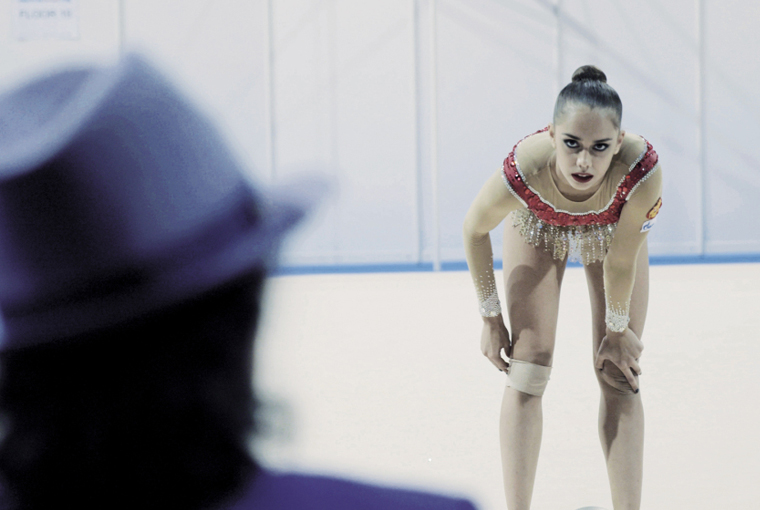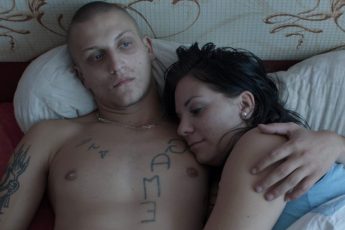Rhythmic Gymnastics Or the Art of Forming Effortless Habits
Marta Prus’ Over the Limit (2017)
Vol. 81 (January 2018) by Moritz Pfeifer
In 1935 the behavioral psychologist Edwin Ray Guthrie observed that
[i]n training a dog to jump through a hoop, the effectiveness of punishment depends on where it is applied […]. It is what the punishment makes the dog do that counts, or what it makes a man do, not what it makes him feel. The mistaken notion that it is the feeling that determines learning derives from the fact that often we do not care what is done as a result of punishment, just as long as what is done breaks up or inhibits the unwanted habit.1
At a time when punishment in dog training (and by analogy in childhood education) was frowned upon by the likes of Edward Thorndike and B. F. Skinner, who saw reward as a more effective motivator, Guthrie wanted to draw attention to the fact that reward and punishment are not asymmetrical. They are two sides of the same coin. The belief that animals (including humans) will be more likely to learn, or, in Guthrie’s words, form stereotyped and effortless habits when they have fun doing so, is emotional prejudice. Trainers shouldn’t be fooled by feelings. What matters are results. If punishment yields the production of the desired habits more efficiently, then it may well be the preferred method.
Polish director Marta Prus’ masterly shot documentary Over the Limit looks at the punitive training habits of competitive rhythmic gymnastics. At the center of the film is the triangular relationship between infamous coach Irina Viner, her more softhearted assistant coach Amina Zaripova and their pupil, the multiple world champion and Olympic gold medalist Margarita Mamun. The film follows the triplet during the year before the Olympic games in Rio, focusing on Rita’s struggle to maintain her ranking as the world’s number one.
The film is clever in concentrating almost exclusively on Rita’s training routine in the gym and her life on the road, thus avoiding to turn into a redemptive medal-collecting chronology. Indeed, if you are not proficient in watching rhythmic gymnastics (like this reviewer), the status of Rita’s accomplishment and talent only becomes explicit towards the end of the film. This enables Marta Prus to depict an unbiased and intimate portrait of competitive rhythmic gymnastics’ grande dame and most successful coach who has beaten the game in looking past all feelings and concentrate exclusively on what is done.
Irina Viner is not your usual soccer mom. She goes to the gym as if it were the Bolshoi Ballet, dressed in flashy designer outfits, oversized pearl-necklaces and heavy make-up. Her silence can be as merciless as her humiliating criticism. If one were to theatrically personify “the gaze” – the heavily theorized disciplinary mechanism of making people feel that they are constantly being watched – it could very well look like Irina Viner. She has compared her relationship to her pupils as one between general and soldiers.2
Where assistant coach Amina Zaripova, herself a former world champion, accepts emotion and compassion, consoling Rita with hugs and kisses when she gets frustrated, encouraging her when she is tired after endless hours of practice or when her body fails her, Irina is there to remind her that such affection is misplaced. “You should treat her like a dog”, “she is not human”, “you can kiss her when she succeeds”, and similar comments sound eerily similar to the methods of pro-punishment animal training manuals of the Guthrie type. Feelings and private life have to be suppressed at all cost and the focus exclusively directed towards turning, say, fouette jumps into a stereotyped habit. What matters is the result. And since Rita, unlike her teammate Yana Kudryavtseva, has not generated the psychological will to go above the limit on her own in order to produce these habits, punishment appears to be the most efficient motivator. At times Viner’s crushing rants – “Go fuck yourself with your shaking,” “You’re going to die, bitch,” “What a stupid loser” – hinge on caricature, were it not for their effect of making Rita train harder.
Madame Viner willingly lends her eccentric appearance to Marta Prus, whose direct cinema style almost makes you forget that Over the Limit is a documentary (cinematographer Adam Suzin deserves equal credit for this). Indeed, Rita’s coach could very well go down in the history of cinema as an archetypal Jewish mother, portrayed in films such as Carl Reiner’s Where’s Poppa? (1970), Woody Allen’s Oedipus Wrecks (1989) or the TV-series Seinfeld (1989-1998). Perhaps the only thing setting Viner apart from these nagging, emasculating, guilt-wielding and manipulating stereotypes is a missing New York accent.3
The conflict of inhibiting the emotional barriers that keep Rita from excelling at her art is complicated by the fact that performing feelings is an essential part of rhythmic gymnastics. For all the repetition that goes into each choreography, it should never appear robotized. Perhaps the most significant scene of the movie is when Rita has finally mastered her choreography – concentrated, flawless and without shaking – and Irina tells her that she might as well quit if she will not start embodying the tragedy of the music that her movements have to stay in tune with. And so she advises Rita to think about her father, who is at home dying from cancer, sadness, like any feeling, only being permitted so long as it serves the desired habit of making Rita’s performance look more authentic.
With Over the Limit, Marta Prus has crafted an exceptionally delicate look behind the scenes of competitive sports training. While uncovering abusive training methods could have easily lapsed into a who’s-to-blame story, Prus manages to humanize her characters. Even the unremitting Irina Viner is given moments of dignity as she drills her pupil to overcome all obstacles and fulfil her dream. Whose dream it is the director is wise enough not to try to answer as it may be bigger than the master-slave relationship her camera was allowed to capture.




Leave a Comment